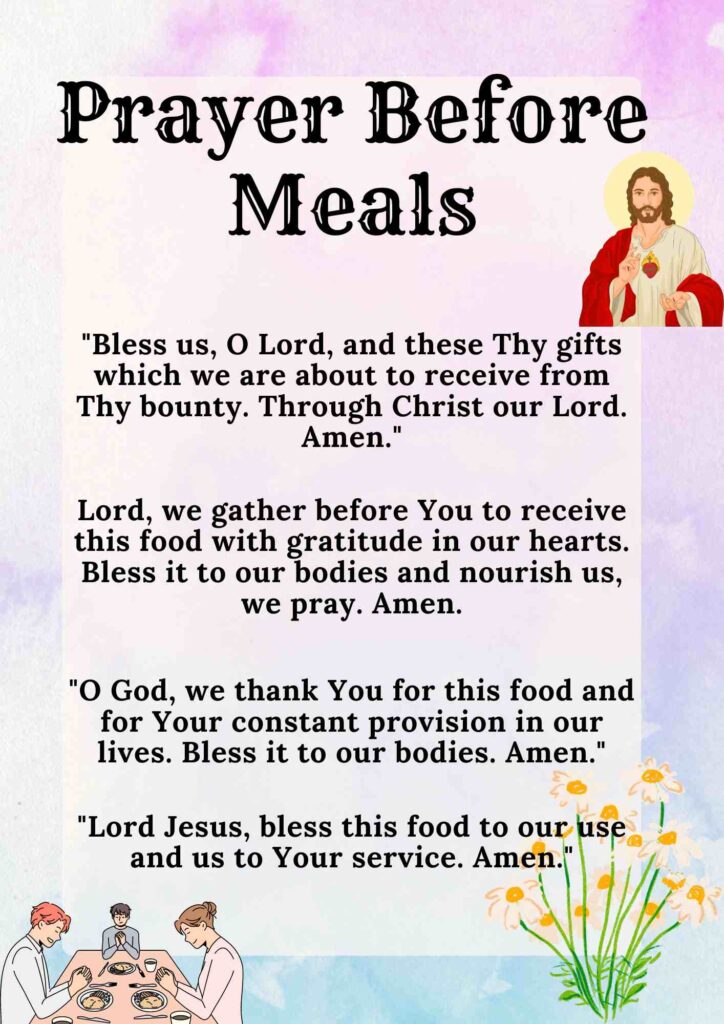Simple Prayer Before Meal
Mealtime is more than just a time to nourish our bodies; it’s a moment to feed our souls with gratitude and reverence. Across cultures and beliefs, the act of praying before meals is a cherished tradition, a way to express thanks, seek blessings, and foster a sense of connection with the divine. In this collection, we present simple prayers before meals, each carrying the essence of heartfelt gratitude and the spirit of communal sharing.
-
“Thank you, Lord, for this food. Bless it to our bodies and use it for your glory. Amen.”
-
“Bless us, O Lord, and these thy gifts which we are about to receive from thy bounty, through Christ our Lord. Amen.”
-
“Lord, we thank you for this meal and ask for your blessings upon it. In Jesus’ name, Amen.”
-
“Heavenly Father, bless this food we are about to eat and nourish our bodies. Amen.”
-
“Dear God, thank you for this food. May it strengthen us and remind us of your goodness. Amen.”
-
“Bless this food, O Lord, and bless those who prepared it. In your name we pray. Amen.”
-
“Thank you, God, for providing us with this meal. May it nourish us and bring us closer to you. Amen.”
-
“Lord Jesus, bless this food to our bodies and help us to always be grateful for your provision. Amen.”
-
“Dear Lord, as we gather around this table, we thank you for your provision. Bless this food and our time together. Amen.”
-
“Heavenly Father, we thank you for this food and ask for your blessings upon it. In Jesus’ name, Amen.”
-
“Lord, we thank you for this meal and for your constant provision in our lives. Amen.”
-
“Thank you, God, for this food and for all your blessings. Bless us as we eat and fellowship together. Amen.”
Catholic Prayer Before Meal
In the heart of Catholic tradition, meals are not just moments of physical nourishment but opportunities for spiritual connection and gratitude. The act of offering a prayer before meals is deeply rooted in Catholic faith, embodying reverence, thanksgiving, and a reminder of the divine presence in everyday life. This article presents a collection of some Catholic prayers before meals, each carrying its unique charm and significance, enriching the dining experience with a touch of sacredness.
Variations of Prayer Before Meals
Prayer before meals is a common practice in many Christian households, symbolizing gratitude and recognition of God’s providence. While this tradition is widespread across various Christian denominations, the specific prayers and customs can vary significantly. This section explores these variations, highlighting traditional prayers in Catholicism, comparing them with prayers from other Christian denominations, and examining regional or cultural differences in mealtime prayer practices.
Traditional Prayers Before Meals in Catholicism
Catholic prayers before meals are often succinct and formulaic, focusing on thanking God for His provision and asking for His blessings. These prayers are deeply rooted in tradition and are passed down through generations. Some examples include:
- Common Catholic Meal Prayer: “Bless us, O Lord, and these Thy gifts, which we are about to receive from Thy bounty. Through Christ, our Lord. Amen.”
- Short Blessing: “Heavenly Father, bless this food we are about to receive, and bless us as we partake of it. Amen.”
- Family Prayer: “Lord Jesus, be our guest, and let Thy gifts to us be blessed. Amen.”
These prayers are typically recited before meals, bringing families together in a moment of shared spirituality and gratitude.
Comparing and Contrasting with Prayers from Other Christian Denominations
While the essence of prayer before meals remains the same across Christian denominations—thanking God for His provisions—the wording and style can differ:
- Protestant Prayers: Protestant prayers before meals often reflect a more personal and extemporaneous style, though there are also traditional prayers. For example:
- Common Protestant Prayer: “Lord, we thank You for this food, for our family, and for Your many blessings. Please bless this meal and our fellowship together. Amen.”
- Personalized Prayer: “Dear Lord, we are grateful for this food and for the hands that prepared it. May it nourish our bodies and help us serve You better. Amen.”
- Orthodox Prayers: In Orthodox Christianity, mealtime prayers are more formal and liturgical, often recited from a prayer book. For example:
- Traditional Orthodox Prayer: “O Christ our God, bless the food and drink of Your servants, for You are holy always, now and ever, and unto ages of ages. Amen.”
- Short Blessing: “Blessed are You, O Lord, who has provided this meal. Amen.”
These differences reflect the theological and liturgical distinctions between the denominations, yet all serve the same purpose of expressing gratitude and seeking God’s blessing.
Regional or Cultural Variations in Mealtime Prayers
The wording and practices of mealtime prayers can also vary by region and culture, reflecting local traditions and customs:
- Latin American Prayers: In many Latin American countries, mealtime prayers are often more elaborate and may include a verse from the Bible. For example:
- “Te damos gracias, Señor, por estos alimentos. Bendice a quienes los prepararon y haznos siempre agradecidos por tus dones. Amen.” (We thank you, Lord, for this food. Bless those who prepared it and make us always grateful for your gifts. Amen.)
- African Prayers: In various African Christian communities, prayers before meals may incorporate elements of song or chant, making the prayer a communal and joyous occasion. For example:
- “Baba yetu, uliye mbinguni, tunakushukuru kwa chakula hiki. Utubariki sisi na familia zetu. Amen.” (Our Father in heaven, we thank you for this food. Bless us and our families. Amen.)
- European Prayers: In European Christian households, particularly in countries with a strong Catholic tradition, prayers before meals can vary from short blessings to more formal prayers, often reflecting the liturgical language of the church. For example:
- In Italy: “Benedici, Signore, questi cibi che stiamo per ricevere. Amen.” (Bless, O Lord, this food we are about to receive. Amen.)
- In France: “Bénissez-nous, Seigneur, et bénissez cette nourriture. Amen.” (Bless us, O Lord, and bless this food. Amen.)
These regional and cultural variations add a rich tapestry of diversity to the practice of prayer before meals, illustrating how the universal act of giving thanks to God can be uniquely expressed across different contexts.
Contemporary Relevance and Practices
In a fast-paced, modern world where mealtimes can often feel rushed or overlooked, the tradition of praying before meals remains a vital practice for many Christians. This section explores the contemporary relevance of this age-old ritual, examining how families and communities incorporate prayer into their mealtime routines and the benefits of fostering mindfulness and gratitude through this practice.
Relevance of Prayer Before Meals in Modern Times
Despite the increasing speed of modern life, the practice of prayer before meals continues to hold significant relevance:
- Anchor in Tradition:
- In a world of constant change, praying before meals provides a sense of continuity and connection to one’s heritage and faith.
- It serves as a daily reminder of spiritual values and principles, helping individuals stay grounded in their beliefs.
- Moment of Pause:
- In the midst of busy schedules, mealtime prayers offer a chance to pause, reflect, and find peace, countering the rush of daily activities.
- This brief moment of stillness can reduce stress and promote a sense of calm and well-being.
- Cultivating Gratitude:
- Praying before meals fosters an attitude of gratitude, encouraging individuals to appreciate the food they have and the effort that went into preparing it.
- This practice helps shift focus from scarcity to abundance, enhancing overall life satisfaction and happiness.
Incorporating Prayer into Mealtime Rituals for Families and Communities
Many families and communities find creative and meaningful ways to integrate prayer into their mealtime routines:
- Family Mealtime Traditions:
- Families often establish regular mealtime prayers, creating a consistent practice that children can grow up with and carry into adulthood.
- Some families may take turns leading the prayer, allowing each member to participate and express gratitude in their own words.
- Community Gatherings:
- In communal settings, such as church potlucks or community dinners, a group prayer before the meal reinforces a sense of unity and shared faith.
- These communal prayers can be more elaborate and inclusive, reflecting the diversity and collective spirit of the group.
- Incorporating Technology:
- In the digital age, families separated by distance can use video calls to share a meal and prayer together, maintaining a sense of connection despite physical separation.
- Apps and online resources provide access to various prayer options, making it easier for individuals to find and use prayers that resonate with them.
Benefits of Mindfulness and Gratitude Through Prayer
Incorporating mindfulness and gratitude into everyday meals through prayer offers numerous benefits:
- Enhanced Well-being:
- Regularly expressing gratitude has been linked to improved mental health, including reduced symptoms of depression and anxiety.
- Mindful eating, encouraged by mealtime prayers, can lead to healthier eating habits and better digestion.
- Strengthened Relationships:
- Sharing a prayer before meals can enhance family bonds, fostering a sense of togetherness and mutual appreciation.
- It provides an opportunity for open communication, allowing family members to express their thankfulness and concerns.
- Spiritual Nourishment:
- Beyond physical sustenance, prayer before meals nourishes the soul, reinforcing one’s relationship with God and fostering spiritual growth.
- It encourages a holistic approach to well-being, integrating physical, emotional, and spiritual health.
- Promotion of Gratitude:
- Regular prayer before meals instills a habit of gratitude, extending beyond mealtimes to other areas of life.
- This practice helps individuals recognize and appreciate the blessings in their lives, leading to a more positive and content outlook.
Conclusion
In the fast-paced and often hectic environment of modern life, the practice of prayer before meals serves as a profound reminder of the importance of gratitude, mindfulness, and spiritual connection. This enduring tradition, deeply rooted in Christian faith, offers individuals and families a moment to pause, reflect, and acknowledge the blessings received. By incorporating prayer into mealtime rituals, believers not only honor their religious heritage but also create a space for communal bonding, spiritual growth, and mental well-being.
Despite the diversity of expressions across different Christian denominations and cultures, the core essence of prayer before meals remains a universal act of thankfulness and reverence. Whether recited in the intimacy of a family dinner or shared in the company of a community gathering, these prayers enrich the dining experience, transforming it into a sacred moment of connection with God and one another. As we navigate the complexities of contemporary life, maintaining this practice can anchor us in our faith, promote a sense of gratitude, and reinforce the importance of recognizing and celebrating the divine providence in our everyday lives.


